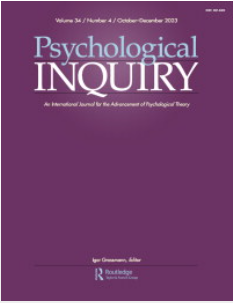当代理和援助被视为可替代的手段时,它们是补偿性的:对评论的回应
IF 4.1
2区 心理学
Q1 PSYCHOLOGY, MULTIDISCIPLINARY
引用次数: 0
摘要
我们非常感谢解说员的深刻评论。大多数评论家都高度赞扬了我们的理论,并同意它的基本原则。他们还让我们注意到支持我们理论的其他数据。然而,一些评论人士指出,数据似乎与我们的理论不一致。接下来,我们将更清楚地阐述代理协助模型的主要主张,讨论我们已经意识到的新的支持数据,并试图澄清我们的理论与评论者指出的一些证据之间的明显矛盾。我们理论的出发点是人类的认知是目标驱动的,同一个目标可以通过不同的方式来实现。我们试图从这个角度来解释个人与社会的关系。为了实现目标,个人既可以依靠自己的手段,也可以依靠他人的手段。目标系统理论中的手段可替代性原则描述了等最终手段之间的关系,即补偿(Kruglanski et al., 2002;Kruglanski, Chernikova, Babush, Dugas, & Schumpe, 2015)。基于这一原则,我们得出了关于个人和社会手段之间关系的两个假设。假设1 (H1)认为,个人实现目标的手段(即个人代理)的有效性越高,个体就越能依靠自己实现目标,对自我的评价也就越高;因此,他/她越不需要依靠别人来实现目标,这也就降低了他们在他/她眼中的价值。同样,假设2 (H2)表明,个体对实现目标(即社会救助)的社会手段的感知有效性越高,个体对社会手段的依赖程度就越高,个体的价值就越高;因此,他/她对个人手段的依赖越少,他/她对自我的评价就越低。本文章由计算机程序翻译,如有差异,请以英文原文为准。
Agency and Assistance Are Compensatory When They Are Perceived as Substitutable Means: A Response to Commentaries
We are grateful to the commentators for their insightful commentaries. Most of the commentators praised our theory highly and agreed with its basic tenets. They also drew our attention to additional data that supports our theory. Yet, some commentators pointed to data that seems to be at odds with our theory. In what follows, we will set out more clearly the main propositions of the Agency Assistance Model, discuss the new supporting data that we’ve become aware of, and try to clarify the apparent contradictions between our theory and some evidence indicated by the commentators. The starting point of our theory is the idea that human cognition is goal-driven, and that the same goal can be pursued by different means. We tried to explain the relationship between the individual and society from this point of view. To achieve goals, individuals can rely either on their own means or on the means of others. The principle of substitutability of means from Goal Systems Theory describes the relationship between equifinal means as compensatory (Kruglanski et al., 2002; Kruglanski, Chernikova, Babush, Dugas, & Schumpe, 2015). Based on this principle, we derive two hypotheses regarding the relationship between individual and social means. Hypothesis 1 (H1) states that the higher the effectiveness of personal means to achieve the goal(s) (i.e., personal agency), the more an individual can rely on himself to achieve the goal(s), and the higher will be his valuation of the self; as a result, the less s/he needs to rely on others to achieve the goal(s), which accordingly reduces their value in his/her eyes. Analogously, Hypothesis 2 (H2) states that the higher the perceived effectiveness of social means for achieving the goal(s) (i.e., social assistance), the more an individual can rely on social means and the higher will become their worth in his/her eyes; as a result, the less s/he needs to rely on his/her personal means and the lower will be their valuation of the self.
求助全文
通过发布文献求助,成功后即可免费获取论文全文。
去求助
来源期刊

Psychological Inquiry
PSYCHOLOGY, MULTIDISCIPLINARY-
CiteScore
10.30
自引率
1.10%
发文量
31
期刊介绍:
Psychological Inquiry serves as an international journal dedicated to the advancement of psychological theory. Each edition features an extensive target article exploring a controversial or provocative topic, accompanied by peer commentaries and a response from the target author(s). Proposals for target articles must be submitted using the Target Article Proposal Form, and only approved proposals undergo peer review by at least three reviewers. Authors are invited to submit their full articles after the proposal has received approval from the Editor.
 求助内容:
求助内容: 应助结果提醒方式:
应助结果提醒方式:


